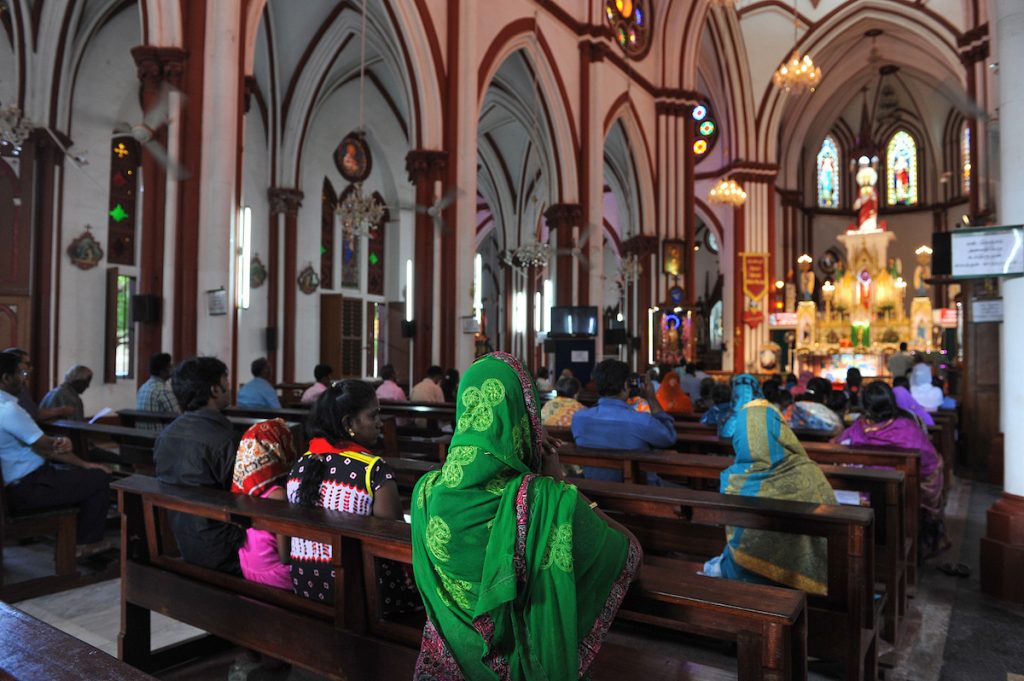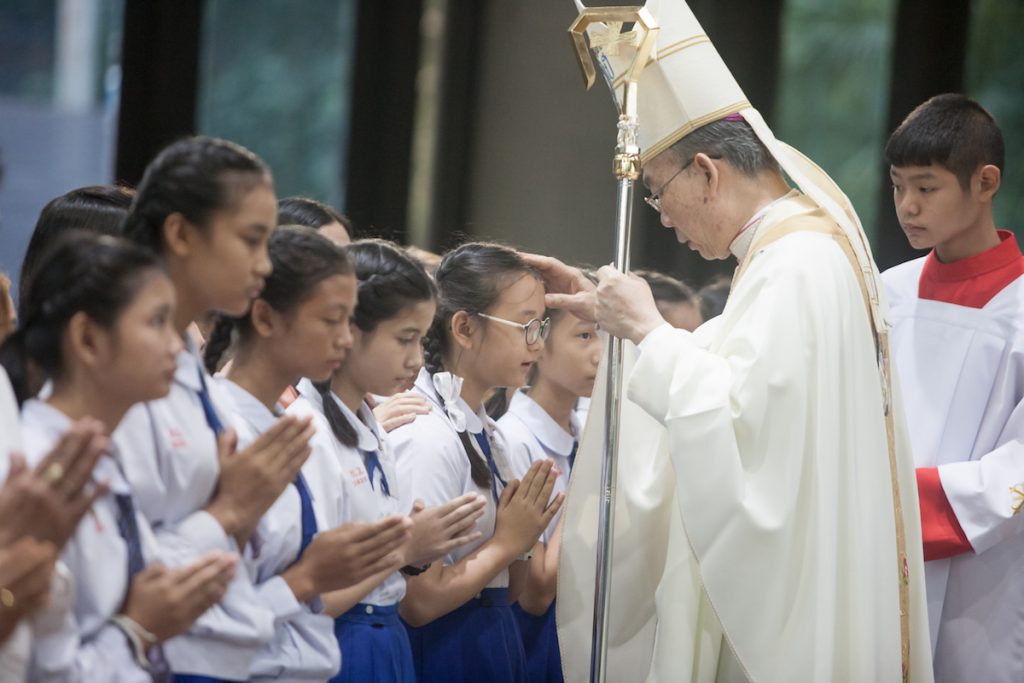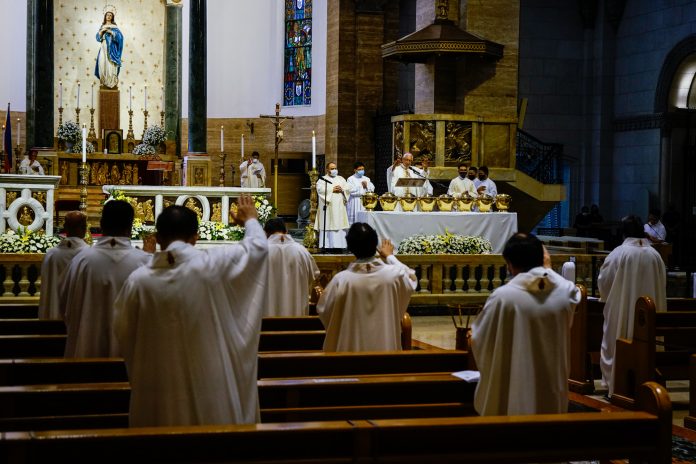The Vatican released on June 25, a new Catholic directory for catechesis that aims to guide the Church’s evangelization efforts, especially on contemporary issues.
The updated “Directory for Catechesis,” which was approved by Pope Francis in March, is a follow-up to the “General Catechetical Directory” of 1971 and the “General Directory for Catechesis” of 1997.
“[It] offers the fundamental theological-pastoral principles and some general orientations which are relevant for the practice of catechesis in our time,” said Archbishop Rino Fisichella in the introduction.
The Pontifical Council for the Promotion of the New Evangelization, which is headed by Archbishop Fisichella, has been responsible for the preparation of the 300-page document.
The new directory aims to guide bishops, priests, religious, and lay Catholics involved in teaching the Catholic faith to the faithful.
The document provides fundamental elements for catechists to highlight in their teaching, including that “God is the initial and final reference of life, from his conception to natural death.”
“The person is always unity of spirit and body; science is at the service of the person; life must be accepted in any condition, because it is redeemed by the paschal mystery of Jesus Christ,” it adds.

Addressing contemporary issues
On more contemporary issues, the directory notes that catechists should promote education rooted in faith and Christian morality in the light of the teachings of the Church.
On bioethics, the directory emphasizes the difference between “therapeutic intervention and manipulation,” especially when it leads to the risk of practicing eugenics.
The document also affirms God’s creation of the human person as “male and female.”
It notes that while the Church is aware of the personal complexity some people experience in the realm of gender and sexuality, “however, she is aware that, in a perspective of faith, sexuality is not only a physical datum, but is a personal reality, a value entrusted to the responsibility of the person.”
On the issue of death penalty, the directory emphasizes the “intrinsic and inalienable dignity” of every human person.
On care for the common home, the directory references the need for “ecological conversion” in the face of accelerating and complex ecological problems.
“A catechesis sensitive to the protection of creation promotes a culture of attention paid both to the environment and to the people who live there,” it states.
It adds that part of environmental responsibility is responsibility and respect for other people by living a life of virtue free of consumerism.
The document also addresses the new challenges of the digital culture and the culture of globalization, citing the need for training in these areas because “they determine each other and produce phenomena that highlight a radical change in the existence of people.”
“Catechesis, therefore, will have to make every effort to make the Church’s teaching understood and to help to create a new culture,” the document states.
It says that every baptized person is a missionary who is called to find new ways of communicating the faith with commitment and responsibility.
The 300-page directory is divided into three parts divided with 12 chapters.
Catechists should be catechized
The first part titled “Catechesis in the evangelizing mission of the Church” speaks of the formation of catechists who must be “catechized before being catechists.”
The guidelines say catechists are called to be vigilant in performing their specific task “so that absolute protection is guaranteed to every person, particularly to minors and vulnerable person.”
The “process of catechesis,” which forms the second part of the directory, underscores the importance of a “profound and effective communicative model” in catechism.

It proposes the use of art through the contemplation of beauty as a means of connecting with God and sacred music as a way of instilling the desire for God in the heart of people.
The guidelines also stress the role of the family, where people receive Christian education in a humble and compassionate manner.
The document says Christians are called to accompany others with closeness, listening, and understanding to be able restore hope and trust.
The directory also highlights the importance of “welcoming and recognizing” the differently-abled, recognizing them as “witnesses to the essential truths of human life” and are to be welcomed as a “great gift.”
Catechesis should also focus on acceptance, trust and solidarity for migrants, who, far from their homeland, may experience a crisis of faith, it states.
Migrants are to be supported in the fight against prejudices and the serious dangers they may face, such as human trafficking, the document adds.
Preferential option for the poor
The directory says the faithful should understand “evangelical poverty” and promote a culture of fraternity and foster indignation against situations of misery and injustice suffered by the poor.
The directory calls attention to be given to prisons, describing them as an “authentic mission land.”
The third part of the directory, “Catechesis in Particular Churches,” is dedicated to catechesis in parishes, ecclesiastical movements, and other Church associations.
Parishes are highlighted as “examples of community apostolate,” which should provide creative catechesis adapted to people’s lived experience.
Other Church associations are also recognized as having “a great evangelizing capacity” that adds to the “Church’s richness.”

For Catholic schools, the directory proposes a movement from being “scholastic-institutions” to becoming “scholastic-communities” of faith with an educational project based on Gospel values.
It notes that teaching religion is distinct from, but complementary to, catechism, adding that “the religious factor is an existential dimension that should not be overlooked.”
The directory affirms that “it is the right of parents and students” to receive integral formation that takes the teaching of religion into account.
Ecumenism and inter-religious dialogue with Judaism and Islam is considered a special area for catechesis.
Catechesis must “encourage the desire for unity” in order for it to be a true instrument of evangelization.
It calls for a dialogue that combats anti-Semitism and promotes peace and justice with Judaism.
The directory calls for catechesis that can “deepen and strengthen the identity of believers,” promoting their missionary impetus through witnessing as well as “friendly and cordial” dialogue.
Archbishop Fisichella said the guiding criterion for the writing of the new edition of the directory was deepening the Church’s understanding of the role of catechesis in the area of evangelization.
Catechesis “needs to take on the very characteristics of evangelization,” but without substituting it, the archbishop said at a press conference on June 25.
“In this relationship, the primacy belongs to evangelization not to catechesis,” he said.
The directory’s introduction states that each directory is in continuity with the Church’s teachings, especially the documents of Vatican II, the Catechism of the Catholic Church, papal encyclicals, and synods of bishops.









